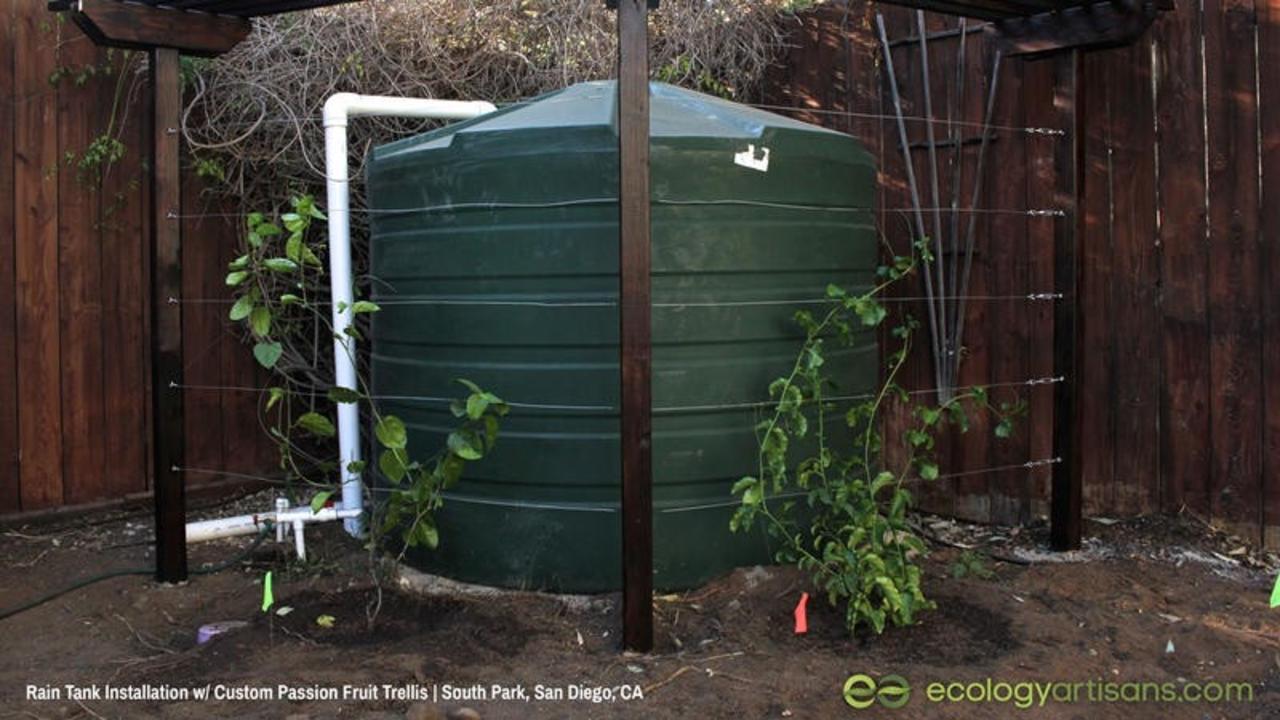Save The Rainwater - Rainwater Harvesting 101

Save the Rainwater - Rainwater Harvesting 101
What is Rainwater Harvesting?
Rainwater harvesting is gathering the excess rainwater from houses with a specific end gol to store it for later use.
Generally, the activity includes harvesting the rain from a rooftop. The rain will gather in raingutter, then it will all flow towards a rainwater tank. Rainwater tanks can vary in size.
Did you know that in a 1' inch rain, you can harvest 600 gallons of water off of a 1000 sq. foot roof? That means in most areas of san diego, if you assume a 2000 sq ft house, we all have the potential to store, 12,000 gallons of water per year! That's a lot of water!
We often don't recommend using 50 gallon rainwater barrels because they fill up so quickly. If you are going to harvesting rainwater, let's take it seriously. Even a small house has a huge potential, so let's size our tanks appropriately.
Rainwater harvesting is turning into a suitable option for providing households and organizations with water. It's not only for the farms any longer! There are numerous nations, for example, Germany and Australia where rainwater harvesting is customary and even required! We should require rainwater harvesting here in San Diego County!
The accumulation of rainwater is known by numerous names all through the world. It ranges from rainwater accumulation to rainwater harvesting to the rainwater catchment and so on. It is believed that rainwater harvesting is a practical innovation in urban settings.
To make the most of this asset, we can catch the free water falling on rooftops and direct it to a rainwater stockpiling tanks. We can also pipe the water directly to the landscape and store the water in the soil, which is the cheapest of all rainwater harvesting methods.
The Importance of Rainwater Harvesting
Rainwater harvesting is vital for a few reasons, yet one of the greatest is that, as per research, the world is running out of water.
Water scarcity has led nations to spend most of the time thinking about water-saving techniques. Have you heard the recent news that Cape Town, South Africa might run our of water.
Cape Town South Africa Is Running Out Of Water
A few countries don’t even have enough to fulfill their everyday water needs. Through rainwater harvesting, you play your part in the preservation of water.
Uses of Rainwater
You can basically utilize rainwater any place you use tap water. Using drinking water to flush our toilets and water our yards is just not right, knowing that some people don’t even have enough to drink. Particularly in the light of increasing population, water deficiency is increasing with each passing moment.
Rainwater accumulation is a procedure to make your home environment-friendly, reduce your water bill, and last but not the least, to make the world a better place.
There are fundamentally three areas where rainwater can be utilized:
- Irrigation
- Indoor, non-consumable chores
- Outdoor, consumable purposes
Ideas for Rainwater Usage
Here are a few ideas to efficiently employ rainwater:
- Hand-water your yard and garden
- Interlink rainwater framework to the irrigation system or sprinkler framework
- Give your vehicles a wash
- Bathe your pets
- Top up your millpond and fountains
- Fill up your swimming pool
- Substitute the utilization of drinking water with rainwater to wash your garages and walkways (in case you don't utilize a broom or a brush)
- Consume it for all indoor non-consumable apparatuses (toilets and laundry)
- Utilize it for every single consumable need when appropriately filtered and cleaned
- Make use of it for mechanical or industrial purposes rather than treated drinking water
One of the easiest techniques to save water is to simply accumulate it, and that's simply referred to as rainwater harvesting. Save water to save the world!
FREE REPORT - 8 Ways To Save Water In Your Landscape
Learn the techniques we use on a daily basis to maximize your water budget.
